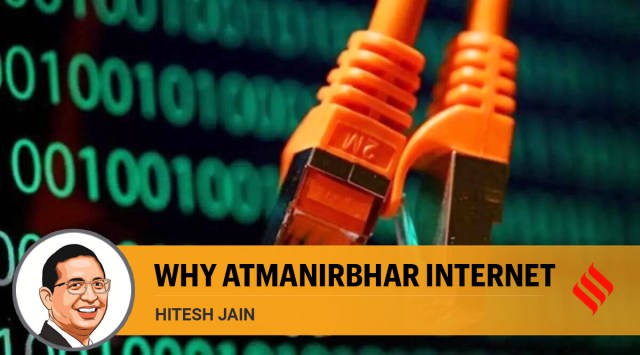- India
- International
Atmanirbhar internet is about self-sufficiency, not protectionism
Hitesh Jain writes: It will keep digital services in India from being at the mercy of Big Tech.
 Those criticising the information technology minister’s call for an atmanirbhar internet mistake self-sufficiency for protectionism.
Those criticising the information technology minister’s call for an atmanirbhar internet mistake self-sufficiency for protectionism.Propriety suggests a tried and tested method for making conclusions. It begins with formulating a hypothesis, testing it through research and then assessing its correctness. Another alternative is to turn this method on its head and work backwards. It entails the formulation of a favourable conclusion, which is followed by cherry-picking facts. Unfortunately, this method is in vogue and it is surprising to see renowned academicians opt for the same.
In an article in this paper (‘The folly of an atmanirbhar internet‘, IE, March 30), Bhaskar Chakravorti took a veiled and somewhat exasperated swing at the country, the government, and oddly, the Minister of State for Electronics and Information Technology, Rajeev Chandrasekhar. The article presents scattered criticism focused largely on the newly introduced Information Technology Rules (IT Rules) that lay down guidelines for social media intermediaries, along with stray observations on India’s role in the Russia-Ukraine crisis.
Grievances against India’s stand on the Russia-Ukraine crisis warrant no explanation. India has always adopted a stance of peace when faced with issues of violence. This approach is not novel; it has been promoted at multiple points in time. The subsequent part of Chakravorti’s article criticises the IT Rules and the idea of an atmanirbhar internet. However, before responding to these misplaced criticisms, we must understand why the government introduced such legislation in the first place.
With the introduction of the IT Rules, the government aims to strike a balance between the commercial interests of social media platforms and the rights of its citizens in the digital sphere. In this context, it is of the utmost importance to point out the role of the nodal officer. In case of a crisis, this officer’s coordination with law enforcement agencies will facilitate timely action and provide a platform for a victim to seek urgent recourse. The shameful Sulli Deals and the Bulli Bai controversy drive home the relevance of such regulations.
The country’s judiciary, too, has highlighted the need for statutory guidelines to curb the spread of content that incites violence. Courts have regularly pulled up social media platforms for failing to do their bit in ensuring a dependable platform for their users. Recently, the Delhi High Court questioned Twitter on its lackadaisical approach in blocking an account that was ridiculing Hindu deities and reprimanded the platform for its lack of responsibility.

Those criticising the information technology minister’s call for an atmanirbhar internet mistake self-sufficiency for protectionism. This defeatist reaction was seen in the past as well when the government announced the RuPay Cards and Unified Payments Interface as an alternative to Visa and MasterCard. Today, the UPI and RuPay success story is studied and analysed across the world. Initiatives such as these encourage the development of alternative organic ecosystems and ensure that we are not left at the mercy of tech giants.
The article disappointingly presents a one-sided picture. It claims that compliance officers of social media intermediaries would be criminally liable for content on their platforms. In reality, social media intermediaries enjoy the privilege of legal immunity under Indian law. Criminal liability is only imposed upon failure to observe measures of due diligence. It also falsely alleges that the premises of Twitter were raided by the police. Actually, officials of the Delhi police visited the premises of Twitter India to merely serve a notice. Much of the criticism in the article is directed towards Rajeev Chandrasekhar. It would be pertinent to mention that Chandrasekhar has vast experience in the field of technology and policymaking.
Those putting forth such ill-conceived arguments should look inward. Policymakers across the United States have raised concerns about the hegemony of Big Tech and have introduced legislation to curb the same. The support for these pieces of legislation cuts across party lines — senators such as Rob Portman (a Republican) and Amy Klobuchar (a Democrat) are amongst their supporters.
Critics would do well to do some homework about the United States’ legislative response to Big Tech before dissecting India’s actions regarding the same.
This column first appeared in the print edition on April 28, 2022 under the title ‘Why atmanirbhar internet’. The writer is managing partner, Parinam Law Associates
EXPRESS OPINION
Best of Express

More Explained
Apr 27: Latest News
- 01
- 02
- 03
- 04
- 05










































